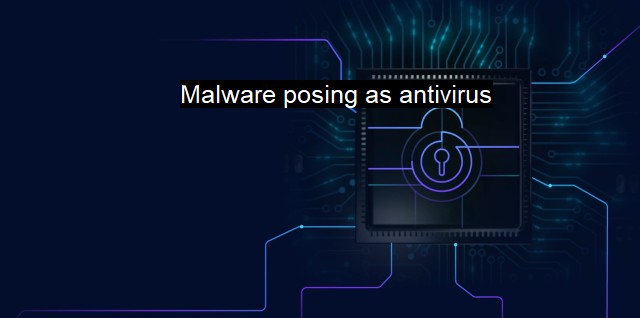What are Malware posing as antivirus?
Avoiding Malware Posing as Antivirus: Understanding the Threat and How to Protect Yourself and Your Business
"Malware posing as antivirus" represents one of the most innovative and deceptive tools in a cybercriminal's arsenal. The term refers to malevolent software designed to exploit the trust that most people place in protective systems, antivirus software in particular, in today's technologically and internet reliant world.The rouge software pretends to be a security-based program, designed to protect a user’s computer from viruses, malware, and other threats. It not only imitates the look and feel of real antivirus software, but it can also mimic their behaviors, going to great lengths to convince the user that it is routinely scanning and identifying 'issues' on their computer that are threatening their data and personal information.
In truth, this so-called antivirus program is a malicious entity in disguise, also known as rogue security software or scareware. It only serves to harm the system instead of securing it. It aims to trick users into paying for 'full versions' of the software to supposedly 'fix' these identified issues or, in worse cases, to steal their personal information.
These rogue antivirus programs can efficiently get into a computer system through spam emails, malicious websites, or compromised ads. The malware will typically create slaveholder screens, intermittent pop-up dialogues, or notification bubbles, reporting 'multiple threats detected' and prompting the user to perform immediate actions to solve these problems. These screens and pop-ups are designed to evoke a sense of urgency in the user, tricking them into acting quickly without considering the authenticity of this antivirus software.
In many cases, users, coerced by fear or unfamiliarity with such notifications, end up relinquishing control to the malware. By providing their credit card details to make a purchase of the ‘full version’ of the rogue antivirus software to resolve the issues, they unknowingly provide cybercriminals with an avenue to steal sensitive financial data and commit identity theft.
Most of these fraudulent antivirus programs would encourage the end-users to download updates, which instead of providing any added protection, opens the system up to other vulnerabilities. the recipients of rogue antivirus software not only risk their financial security but also expose themselves to potential hacks, breaches, and data loss due to possible additional embedded malware.
Prevention and proactive defence are the ideal ways to protect oneself from falling for such ploys. The best way to keep your system secure is to ensure a tried-and-tested, legitimate antivirus software installation from a trusted source. Any alert raised on the security status of your digital setup should be dealt with the seriousness and depth it deserves.
Effort should be put in to verify the software claims by inspecting the program thoroughly before accepting and acting upon its advice. keeping the operating systems and other critical software updated can protect your system from downloading and installing rogue software unintentionally. it is common sense but critically valuable advice that never should be you tricked into providing your credit card details, banking information, or other personal data based on some alerts or issues raised by unknown or random software.
"Malware posing as antivirus" serves to remind us that, in an age dominated by cyber activities, understanding the threats out there is only half the battle. The other half is protection—ensuring that our GPS-guided globe and virtual assets are guarded with vigilance, verified programs, and system literacy. Only then do we stand a chance against such sophisticated cyber threats.

Malware posing as antivirus FAQs
What is malware posing as antivirus?
Malware posing as antivirus is a type of malicious software that disguises itself as a legitimate antivirus program in order to trick users into downloading and installing it on their computers. Once installed, the malware can do harm to the user's computer by stealing personal information or damaging files.How does malware posing as antivirus work?
Malware posing as antivirus typically works by using scare tactics to convince users that their computer is infected with viruses or other types of malware. The fake antivirus will then offer to perform a scan and remove the threats, but instead will install the malicious software.What are some signs that my computer may be infected with malware posing as antivirus?
Signs that your computer may be infected with malware posing as antivirus include constant pop-ups and alerts claiming that your computer is infected, slow performance, and the presence of unfamiliar icons or programs on your desktop.How can I protect myself from malware posing as antivirus?
To protect yourself from malware posing as antivirus, it is important to use a reputable antivirus program that is regularly updated. Additionally, be cautious of pop-ups and alerts that claim your computer is infected and never download or install software from unfamiliar websites. Lastly, staying informed on the latest cyber threats and trends can also help you stay protected.| | A | | | B | | | C | | | D | | | E | | | F | | | G | | | H | | | I | | | J | | | K | | | L | | | M | |
| | N | | | O | | | P | | | Q | | | R | | | S | | | T | | | U | | | V | | | W | | | X | | | Y | | | Z | |
| | 1 | | | 2 | | | 3 | | | 4 | | | 7 | | | 8 | | |||||||